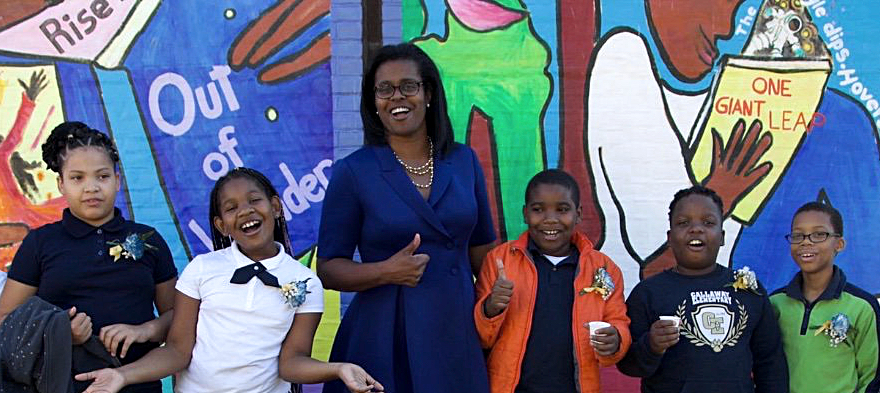
Feb 11, 2020 12:00:00 AM
A few nights ago the CEO for Baltimore Public Schools joined my colleagues on the 8 Black Hands podcast to discuss her efforts to improve that city’s classroom results. Dr. Sonja Santelises, whose four years on the job have seen increases in test scores and greater stability of the district, is one of only two CEO’s for that district to be offered a second contract in 23 years. The “blueprint for success” she brought with her to the position four years ago focuses intently on community power-sharing, student “wholeness” and instructional quality.
It’s important to note that Baltimore is widely seen as a city without hope for many children. Media has popularized narratives about the city that highlight violence, corruption and blight. It would take a native daughter to such a city like Santelises to see beyond the grit and into the possibilities.
Speaking with Santelises triggered memories of my time as a school board member more than a decade ago. Back then my colleagues and I looked to Baltimore because they were touted as leaders in the march toward educational equity—at least in the area of school finance. School districts from across the country were visiting Baltimore to see how their version of weighted student funding could change how high-poverty schools were resourced to meet the special challenges they faced.
More than anything I was a student of education reform back then. There was no policy paper or report or article too dense for me. [pullquote]I naively believed our Minneapolis public schools could easily halve our racialized gaps in student outcomes if only we could import great ideas like those we saw in Baltimore and elsewhere. That was foolish.[/pullquote]
I learned that school districts collaborate with each other and routinely exchange information about “what works,” but translating successful strategies from one city to another is like carrying water in cheesecloth. Swapping gossip with school board members in other districts gave me insight into the notoriously bad problem districts have with implementation. It’s what led me more than once to say districts are hospice for great educational ideas.
[pullquote position="right"]Like fish, many education ideas won’t freeze, ship and thaw well.[/pullquote]
When I asked Dr. Santelises what she thought it would take for a district to bring all the best elements of good programs, leadership, curriculum, and management ideas from other districts into one coherent plan, she said I should tell her when I find out. Like all of us, she has seen great schools that “beat the odds” at the site level, but she hasn’t seen an entire district operationalize a comprehensive plan that lifted all boats.
That’s sobering. In all of this work we do to highlight educational inequity, and all the pushing we do for something approaching “reform,” the more we learn to resist oversimplifying the tough political, economic and social realities that public schools swim in. There are no easy answers. There are no policies that work the same everywhere. There is little we can promote as the single answer to cure what ails public schools across the country.
And, yet, as Dr. Santelesis does, [pullquote]we must use what we know to design blueprints that keep us accountable for progress.[/pullquote] We can’t fall into the convenient nihilism of proclaiming “nothing works” and resigning ourselves to elitist appeals to the causation of poverty as the sole enemy in the war against racialized educational outcomes. Almost nowhere in America is there a school district that could be more justified for giving up than Baltimore, but, as we’ve seen, a good plan and committed leaders can make a difference.
What about your city? Is there a plan in place? Is it informed by the community? Is it accountable for year-over-year progress? Is it supported by all the leaders of your city?
These are the questions anyone can ask to do their part in making the world better for children.
https://brightbeamnetwork.org/the-secret-shame-how-americas-most-progressive-cities-betray-their-commitment-to-educational-opportunity-for-all/An award-winning writer, speaker, and blogger, Chris Stewart is a relentless advocate for children and families. Based in outstate Minnesota, Chris is CEO of brightbeam, a nonprofit media group that runs campaigns to highlight policies and practices that support thriving kids. He was the founding Director of the African American Leadership Forum, was an elected member of the Minneapolis Board of Education, and founded and served as the CEO of Wayfinder Foundation. Above all, Chris is a serial parent, a Minecraft enthusiast, and an epic firestarter on Twitter where he has antagonized the best of them on the political left and right. You’ll often see Chris blogging at citizenstewart.com and “tweeting” under the name “Citizen Stewart.”
The story you tell yourself about your own math ability tends to become true. This isn’t some Oprah aphorism about attracting what you want from the universe. Well, I guess it kind of is, but...
If you have a child with disabilities, you’re not alone: According to the latest data, over 7 million American schoolchildren — 14% of all students ages 3-21 — are classified as eligible for special...
The fight for educational equity has never been just about schools. The real North Star for this work is providing opportunities for each child to thrive into adulthood. This means that our advocacy...
Your donations support the voices who challenge decision makers to provide the learning opportunities all children need to thrive.
Ed Post is the flagship website platform of brightbeam, a 501(c3) network of education activists and influencers demanding a better education and a brighter future for every child.
© 2020–2024 brightbeam. All rights reserved.
Leave a Comment